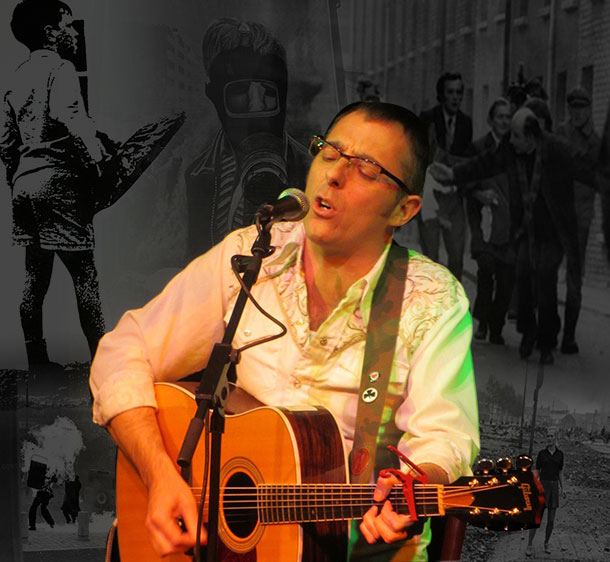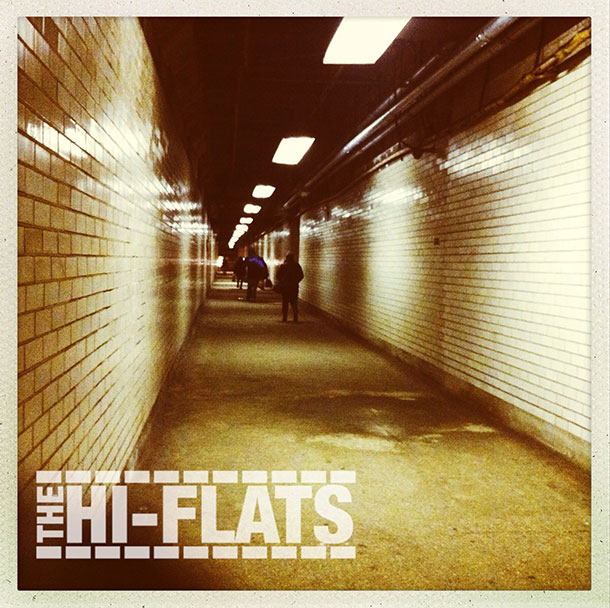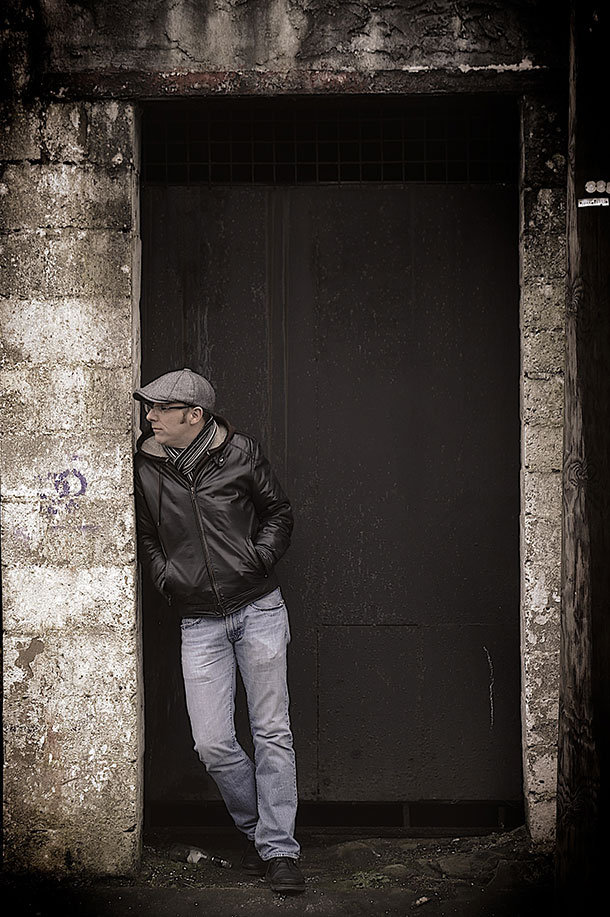12 January 2015 Edition
‘Derry’s Springsteen’ – Damien Dempsey

• ‘Phil Coulter sings about the town being brought to its knees – 1969 was about our people getting up off their knees and fighting back’ – Declan McLaughlin
‘His lyrics are raw, urban poetry. I love Deccy’s passion’ – Damien Dempsey
Peadar Whelantalks to Declan McLaughlin about the new Hi-Flats CD
THE PHONE RANG. The familiar voice at the other end rattled my eardrums. “Peadar Whelan! How are ye? I’ve a new CD out – will An Phoblacht do a review of it?”
It wasn’t so much a request from Declan McLaughlin but an offer I couldn’t refuse. So, a week later, off to Derry I travelled on a wet, dreary Monday, the first day of December, to talk to the front man of The Hi-Flats, the third reincarnation of Deccy’s musical experience that included The Screaming Binlids and The Whole Tribe Sings.
Although well-known as a solo performer, the impact of The Screaming Binlids and The Whole Tribe Sings on the music scene in Derry and beyond is testament to the authenticity of McLaughlin’s music and especially his lyrics.
Damien Dempsey described Deccy as “Derry’s Springsteen . . . his lyrics are raw, urban poetry”, said the Dublin songster before adding “I love Deccy’s passion”.
Despite this acclaim from a man hailed by magazines from Mojo to Hot Press and Billboard as one of the greatest singer/songwriters of his generation, while Declan McLaughlin’s music has a dedicated following in certain circles, it isn’t popular with (as he put it himself) “the Derry Establishment”.
Essentially, the musical journey that McLaughlin has travelled has been a political one. His lyrics reflect the experience of young people growing up and surviving the war on their streets, the poverty and unemployment they see everywhere around them, and he talks about the way people deal with life and living in those circumstances.
Some of his songs explore how kids turn to drugs and, in Derry’s case, how too often an older generation turned to that traditional drug of choice, alcohol, to deal with the difficulties life threw at them.

I meet Deccy in the shelter for addicts where he works. As an artist and a community activist, he sees life in its rawest form.
His latest CD, the eponymous The Hi-Flats (which includes his long-time musical collaborator and producer Dougal McPartland, and features Leanne Doherty on vocals) goes to the heart of what Declan McLaughlin’s music is about.
The ‘Flats’ in the heart of Derry’s Bogside were witness to the politics of the North throughout the conflict with the Orange State.
“They were central to ‘The Battle of the Bogside’ and they were symbols of the political and social corruption that lead to the civil rights protests of the late 1960s,” Deccy says as he lays out the background to what has shaped his music and outlook.
“And then the Bloody Sunday killings took place in their shadow.”

He explains that a lot of his early political activity centred on his involvement with the Bloody Sunday Initiative and over time became heavily involved in the campaign for justice.
His Running Up Hill, written for the 1998 anniversary of the massacre, is a masterpiece. It is a protest/campaign song that is up there with the classics of Dylan, Seeger and Guthrie.
As a member of the city’s Sinn Féin youth organization, McLaughlin’s republicanism had a significant influence on his songwriting.
“My music was always about the link between revolutionary politics and culture and the way in which we needed to frame the conversation around the issues that impacted on our lives.
“I was always conscious that I wanted to see young people become empowered and active.
“As the North changed after the 1994 cessation and politics came to the fore, I tried to give that an expression in my songs.”
Arrest, imprisonment, unemployment, relationships, drugs and just plain living in Derry are themes of his songs but his lyrics speak to working-class people everywhere.
His lyrics are strong and powerful, as well as cutting.
Fine Day (from 1995) is a great example of that, as is his updated take on Weile Waile, which sets the story of the woman who killed her baby in a modern context of post-natal depression, prescription drugs and suicide.
There is certainly a dark side to McLaughlin’s songwriting that contrasts with the idealised notion epitomised by Phil Coulter’s The Town I Loved So Well of music being ever-present in the Derry air.
“Coulter sings about the town being ‘brought to its knees’,” Deccy points out but refutes that: “1969 was about our people getting up off their knees and fighting back. That’s what I want to be singing about.”
Anyone wanting to get a real sense of what it is to hear someone who’s not afraid to sing about real issues can go to www.declanmclaughlin.bandcamp.com. Declan McLaughlin and The Hi-Flats album is also available from the website




